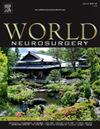利用超声波骨钻辅助改进 C1 椎弓根螺钉植入术治疗寰枢椎失稳
IF 1.9
4区 医学
Q3 CLINICAL NEUROLOGY
引用次数: 0
摘要
目的本研究旨在评估与传统的高速钻(HSD)技术相比,超声骨钻(UBB)在促进椎弓根螺钉置入治疗寰枢椎不稳(AAI)方面的安全性和有效性。方法对2017年12月至2023年7月期间接受后螺钉连杆固定治疗AAI的患者进行了回顾性分析。根据螺钉置入时使用的工具将患者分为两组:UBB组和HSD组。收集并分析了手术时间、估计失血量、脊髓和动脉损伤发生率、螺钉置入准确性、日本骨科协会(JOA)评分测量的神经状态和融合率等数据。结果 13 例患者通过 UBB 促进法接受了 C1 椎弓根螺钉置入术,8 例患者使用 HSD 方法进行治疗。与 HSD 组相比,UBB 组明显减少了失血量和手术时间(分别为 P=0.002 和 P<0.001)。两组均未发生脊髓或动脉损伤。所有 UBB 病例都确认了最佳螺钉置放,而 HSD 组为 87.5%(P=0.139)。两组的JOA评分均有明显改善,组间无差异。UBB组的融合率为100%,HSD组为87.5%,无统计学差异(P=0.381)。结论 UBB是一种可行的C1椎弓根螺钉置入替代方法,可减少失血量,缩短手术时间,同时获得与传统HSD方法相当的临床效果。尽管如此,仍需进行样本量更大的进一步研究。本文章由计算机程序翻译,如有差异,请以英文原文为准。
Improving C1 Pedicle Screw Placement for Atlantoaxial Instability with Ultrasonic Bone Burr Assistance.
OBJECTIVE
This study aims to evaluate the safety and efficacy of the ultrasonic bone burr (UBB) in facilitating C1 pedicle screw placement for atlantoaxial instability (AAI) treatment, compared to the conventional high-speed drill (HSD) technique.
METHODS
A retrospective analysis was conducted on patients undergoing posterior screw-rod fixation for AAI between December 2017 and July 2023. The patients were divided into two groups based on the tools used for screw placement: UBB and HSD. Data on surgical duration, estimated blood loss, spinal cord and arterial injury incidence, screw placement accuracy, neurological status measured by the Japanese Orthopedic Association (JOA) score and fusion rates, were collected and analyzed.
RESULTS
13 patients received C1 pedicle screw placement via UBB facilitation, while 8 were treated using the HSD approach. The UBB group showed a significant reduction in blood loss and operation time compared to the HSD group (P=0.002 and P<0.001, respectively). No spinal cord or arterial injuries occurred in either group. Optimal screw placement was confirmed in all UBB cases versus 87.5% in the HSD group (P=0.139). Both groups demonstrated significant improvements in JOA scores with no inter-group difference. The fusion rate was 100% in the UBB group and 87.5% in the HSD group, not statistically different (P=0.381).
CONCLUSIONS
UBB is a viable alternative for C1 pedicle screw placement, associated with reduced blood loss and shorter operation time, while achieving comparable clinical outcomes to the conventional HSD method. Nevertheless, further research with a larger sample size is needed.
求助全文
通过发布文献求助,成功后即可免费获取论文全文。
去求助
来源期刊

World neurosurgery
CLINICAL NEUROLOGY-SURGERY
CiteScore
3.90
自引率
15.00%
发文量
1765
审稿时长
47 days
期刊介绍:
World Neurosurgery has an open access mirror journal World Neurosurgery: X, sharing the same aims and scope, editorial team, submission system and rigorous peer review.
The journal''s mission is to:
-To provide a first-class international forum and a 2-way conduit for dialogue that is relevant to neurosurgeons and providers who care for neurosurgery patients. The categories of the exchanged information include clinical and basic science, as well as global information that provide social, political, educational, economic, cultural or societal insights and knowledge that are of significance and relevance to worldwide neurosurgery patient care.
-To act as a primary intellectual catalyst for the stimulation of creativity, the creation of new knowledge, and the enhancement of quality neurosurgical care worldwide.
-To provide a forum for communication that enriches the lives of all neurosurgeons and their colleagues; and, in so doing, enriches the lives of their patients.
Topics to be addressed in World Neurosurgery include: EDUCATION, ECONOMICS, RESEARCH, POLITICS, HISTORY, CULTURE, CLINICAL SCIENCE, LABORATORY SCIENCE, TECHNOLOGY, OPERATIVE TECHNIQUES, CLINICAL IMAGES, VIDEOS
 求助内容:
求助内容: 应助结果提醒方式:
应助结果提醒方式:


